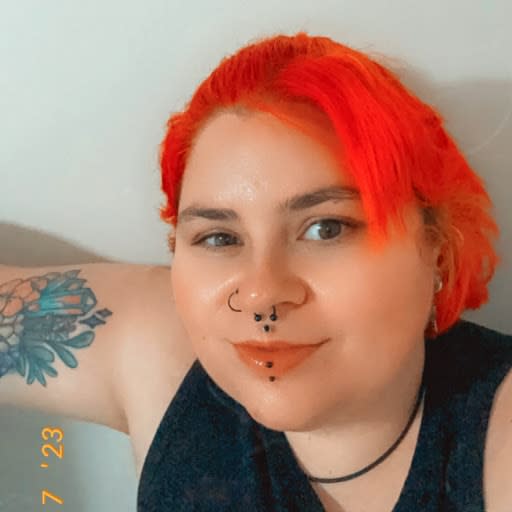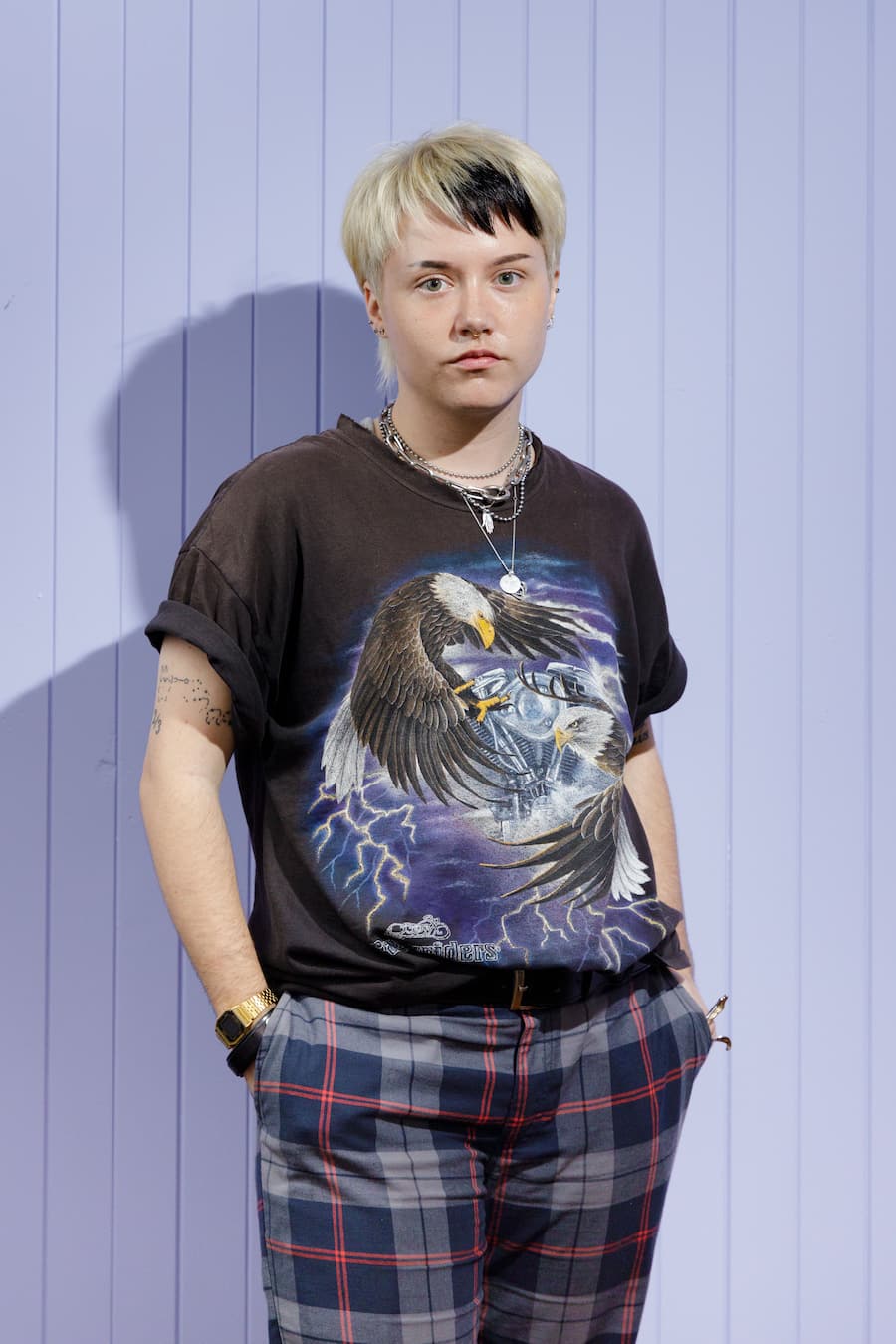3 non-binary people share stories of loneliness
Existing outside the binary and embracing your gender identity can be a beautiful and freeing experience, but it can also be a lonely one. If you’re non-binary and feeling lonely and isolated, you’re not alone. Recent research from ReachOut shows that 60 per cent of non-binary young people in Australia experience loneliness.
Hear from Kai, Rudy and Gabby on times they felt alone, and on how they reconnected with the world around them.
Sometimes a place that is meant to welcome all can feel the most lonely – Kai
As a teenager, I was constantly striving to fit in. I was always trying to make friends and feel like I belonged somewhere, which is why I was so excited when a friend offered to bring me to her youth group at the local pentecostal church.
She said she'd made lots of good friends there and always felt welcome, which of course was something I'd been hoping for.
For the next couple of years, we'd meet outside of my high school every Friday afternoon and wait for the bus to come and bring us to the church. It was everything I'd wanted: a place where I could hang out with people my own age and play fun games – somewhere I felt welcomed.
After I’d graduated from high school and stopped being able to attend the youth group, the place that once felt welcoming began to feel very lonely. The friends I'd made had mostly changed churches, or simply left. My other friends had all joined groups that weren't too fond of people they didn't know.
It was at this point that I'd also finally realised, and allowed myself to accept, that I was both queer and not, in fact, a woman. That began to make me feel even more isolated in the church, especially as I watched all my old friends begin to get married and start families with other people from the church. I felt so isolated, like no one understood me.
Loneliness is normal. It's something everyone will feel at one stage or another, but it's also something that doesn't have to last forever.
I'd lost touch with a lot of friends outside of the church and this made my feelings of loneliness even more intense. I felt that I had no one to turn to that would listen and accept me. One Sunday night in 2018, after service, I went home and realised that I couldn't keep on going like this. I had to do something to make me feel more connected and less alone.
I decided to leave the church. I knew this decision would make me feel even more lonely, as I'd be cutting off my already limited connections, but slowly I started to reconnect with the friends I'd lost and also with the things I love to do.
I created art. I wrote stories. I made friends. And, even more importantly, I found a new community – a community of people who loved me and accepted me with open arms.
Loneliness is normal. It's something everyone will feel at one stage or another. But it's also something that doesn't have to last forever. Thanks to this experience, I now know what I can do to make me feel less alone. By strengthening my connection to myself and doing the things I love to do, I hardly ever feel lonely anymore.
Learning the history of my community helps me to feel less alone – Rudy (@RainbowHistoryClass)
What if I told you that I feel less alone today, thanks to people who existed hundreds of years before me? In March 2021, Hannah McElhinney and I started Rainbow History Class, home of the queer and trans history you don’t get in school. Once we began sharing the rich history of our LGBTQ+ community online, I suddenly realised that people who look like me aren’t few and far between – we exist in even the furthest parts of the world.
Before the wonders of the internet brought Hannah and me together, I was out of a job, thanks to the pandemic. Crafting, gaming and hot girl walking were really all I’d been doing with myself for over a year. But back in the golden year of 2019, I was working a retail job where I was known by our regular gender-diverse customers as the ‘token gender-diverse employee’ and, as such, we had grounds for a unique customer–staff member connection.
I would host informal styling sessions in the dressing-room area in the back of the store. Occasionally, I would step back from adjusting a belt or a sleeve length and realise that these small, communal gatherings were some of the only times I ever saw anyone who looked like me.
I used to hold my breath, waiting for other trans and non-binary folk to walk into the store because those were the only times I felt connected to someone other than myself.
Those moments reassured me that somewhere outside that crowded little shop there existed people just like me.
When my days of slinging garments came to an abrupt end, I felt like my one connection to the trans community had suddenly vanished. I was alone again and so, like many others, I found myself taking solace online. When Hannah and I posted our first few videos, I had no idea what I was in for. My life has undoubtedly changed forever since then, but one of the most outstanding things that Rainbow History Class has taught me isn’t that people like me have existed forever; it’s that people just like me exist everywhere, right now.
Our Rainbow History Class community is over half a million people strong, and many of them are gender diverse. I’ll never forget the first time someone told me that I made them feel seen, represented and, importantly, less alone. I do sometimes wonder if the folks who comment about feeling represented know that I feel the very same way when I read their words, look into the crowd at one of our live shows, get stopped in the street for a quick hello, or when someone sends me a beaming selfie of them with our book.
I’m reminded of how, for years, I felt like I lived in a small, secluded bubble; of how I felt in 2019, standing alone in that shop once I’d sent the regulars off on their merry way. I feel sad thinking of how lonely I was then, but even just the thought of telling my past self that there was a whole world (quite literally) waiting for them outside those shop doors brings a quiet little smile to my face.
I lost touch with others because I lost touch with myself – Gabby
In 2023, the journey of self-acceptance is becoming easier. Overall, people’s minds are more open, there are more support groups, and help is more accessible. But what those things don’t always assist with is the feelings of loneliness that come with learning to accept yourself.
In 2020, during COVID-19, I was graduating from high school. Some time before COVID I had lost my grandmother, and just after the first lockdown I moved from my childhood home, far from the only friends I’d ever had. I witnessed two family members pass and, during all that, I was discovering my non-binary identity and understanding my ADHD.
Through all of this, it’s only ever been my mum and me at home – just the two of us. It was easy to feel isolated. My mother is the best mum I could ask for, but it was difficult to be open with her, because when it comes to being non-binary, even I couldn’t understand it at first.
It felt like a separation from what I had thought was true about me. Am I a girl? A boy? I’m originally a girl; am I trying to be a boy? Or does that not quite fit? I was an only child with a single mum who worked hard every day, and it felt silly to bother her with something that might seem trivial.
Self acceptance can be a much harder process when you’re doing it alone.
Just as I was beginning to confide in my friends — bam! Welcome to COVID life. Graduating in 2020 was one of the worst instances of bad luck I’ve ever had. Quarantine wasn’t terrible, at first. But as it went on, the impacts of isolation became worse.
I became quiet and sometimes irritable with stress. I didn’t feel like a girl or a boy, or they/them, or a sometimes-she-sometimes-he. I was locked in a room with myself, and I couldn’t get out. I was steadily losing certainty about who I was. With the computer as my only point of contact with others, I had shallow conversations with my friends. Behind the screen, I was anxious 24/7.
I felt like I was suffering in silence, but what I didn’t know was that my friends and family had noticed how I was feeling. They gave me the space to share what I was going through and they supported me with my journey to self-acceptance. They told me: ‘There aren’t standards for just being you.’
What this experience taught me was that it’s easy to diminish your own value, to lose touch with others because you’ve lost touch with yourself, and that self-acceptance can be a much harder process when you’re doing it alone.
I know now to not let distance overwhelm me. To trust in my judgement and in the people around me to understand my choices. Grief, distance, loneliness, identity, just the monumental task of surviving — these are all issues that I can cope with, thanks to the support of the people who love me.
What can I do now?
Feeling lonely? Try one of these 11 things to do when you’re feeling lonely.
Read some more stories from your community over on our Gender page.
Learn some trans and non-binary history on the Rainbow History Class TikTok.

